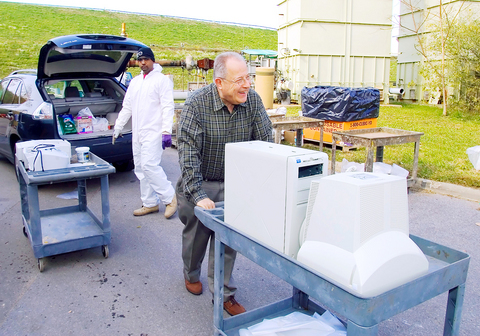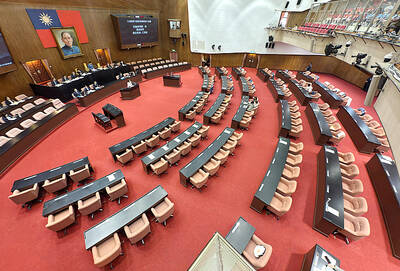It was as if a floodgate of memory, electronic memory, suddenly burst open. From out of closets, and from deep corners of basements, emerged the digital equivalent of a thousand Proust-like madeleine moments: old Commodore 64s with cracker crumbs in the keys, original IBMs with floppy disks but no hard drives, perfectly good but long dormant things called word processors.
Even some Pong games have come mixed in among the 455 monitors, 300 central processing units, 205 printers and 55 laptops that have spilled onto the floor at the town dump here since the cutting-edge recycling program for electronics began in April.
"This stuff has been in the basement for about eight years," Brad Hantverk, a Roslyn Heights dentist, said as he hauled from his trunk two monitors, a CPU, three VCRs, a scanner, two keyboards and a printer. "I've been waiting and waiting."

PHOTO: NY TIMES NEWS SERVICE
The Environmental Protection Agency estimates that individuals threw away 2.5 million tonnes of electronic equipment, known as e-waste, last year, about 10 percent of which was recycled. While federal law regulates the disposal of electronics by businesses and government agencies, it does not affect individual consumers, who account for more than half the e-waste produced annually, according to the federal agency.
Every old computer monitor contains about four pounds of lead, and other parts are filled with heavy metals like mercury, arsenic, cadmium and chromium. They have toxins that hover in the air after incineration or leach into the water supply when buried in landfills. Researchers at Carnegie Mellon University in Pittsburgh say that dumps around the nation's major cities, including New York, hold more than 60 million computers.
Now, a consensus is emerging among environmentalists and public officials that protections need to be put in place against a dam-bursting amount of obsolete computer equipment and televisions sitting in US closets and basements that could soon hit the waste stream.
Six states have passed laws, most in the last two years, requiring individuals to recycle electronic trash; the New York State Legislature is expected to consider such a bill next year, having passed a narrower measure mandating recycling of cellphones that takes effect in January.
Aside from environmental concerns or instinctive hoarding, many consumers retain computers long after their life cycles out of fear that personal information on their hard drives could be stolen. In fact, such data can easily be erased by computer experts before tossing equipment into the trash. It is destroyed during the recycling process, anyway.
The new recycling surge comes amid a flood not only of old equipment but also of newer-model computers, televisions, laptops, cellphones, BlackBerries, iPods and everything else electronic.
"The rate at which tech-savvy consumers are buying new electronics -- the thinner laptop, the next generation iPod, the newest of the new everything -- is fairly unprecedented," said Alex Fidis, a staff lawyer for the US Public Interest Research Group, which is pushing for environmental protection against e-waste.
Matthew Hale, director of the Environmental Protection Agency's office of solid waste, said the federal government was increasingly concerned about a coming tidal wave of electronic trash.
"People have been buying electronics for a long time, and they tend to keep electronics for a long time," he said in a telephone interview. "But it's a maturing industry, and we're beginning to see significant waste streams."
Recycling a computer usually means taking the valuable metals out of it and selling them. Michael Lodick, president of Electronics Recycling Technologies, in Buffalo, which handles e-waste for a number of public and private customers including North Hempstead, said some computers were refurbished and sold to schools. But most end up disassembled, sorted, crushed and melted down to elemental parts.
The six states that now require recycling of electronics -- have each taken slightly different tacks, but the conflicts their lawmakers confronted were almost always the same, said Lynn Rubinstein, executive director of the Vermont-based Northeast Recycling Council, which lobbied for some of the bills. Who would collect the stuff? Who would recycle it?
And most of all, who would pay? The question of financing, she said, was always a core issue.
Similar issues are in play in negotiations over drafts of a New York law expected to be introduced when the Legislature reconvenes next year by State Senator Carl Marcellino, a Long Island Republican who recently headed a 10-state task force on e-waste.
"Is it fair to charge people buying something today for recycling other people's equipment that is 5 or 10 years old?" asked Debbie Peck Kelleher, an assistant to Senator Marcellino.

The Chien Feng IV (勁蜂, Mighty Hornet) loitering munition is on track to enter flight tests next month in connection with potential adoption by Taiwanese and US armed forces, a government source said yesterday. The kamikaze drone, which boasts a range of 1,000km, debuted at the Taipei Aerospace and Defense Technology Exhibition in September, the official said on condition of anonymity. The Chungshan Institute of Science and Technology and US-based Kratos Defense jointly developed the platform by leveraging the engine and airframe of the latter’s MQM-178 Firejet target drone, they said. The uncrewed aerial vehicle is designed to utilize an artificial intelligence computer

The Chinese Nationalist Party (KMT) caucus yesterday decided to shelve proposed legislation that would give elected officials full control over their stipends, saying it would wait for a consensus to be reached before acting. KMT Legislator Chen Yu-jen (陳玉珍) last week proposed amendments to the Organic Act of the Legislative Yuan (立法院組織法) and the Regulations on Allowances for Elected Representatives and Subsidies for Village Chiefs (地方民意代表費用支給及村里長事務補助費補助條例), which would give legislators and councilors the freedom to use their allowances without providing invoices for reimbursement. The proposal immediately drew criticism, amid reports that several legislators face possible charges of embezzling fees intended to pay

REQUIREMENTS: The US defense secretary must submit a Taiwan security assistance road map and an appraisal of Washington’s ability to respond to Indo-Pacific conflict The US Congress has released a new draft of the National Defense Authorization Act (NDAA), which includes up to US$1 billion in funding for Taiwan-related security cooperation next year. The version published on Sunday by US House of Representatives Speaker Mike Johnson removed earlier language that would have invited Taiwan to participate in the US-led Rim of the Pacific Exercise (RIMPAC). A statement on Johnson’s Web page said the NDAA “enhances U.S. defense initiatives in the Indo-Pacific to bolster Taiwan’s defense and support Indo-Pacific allies.” The bill would require the US secretary of defense to “enable fielding of uncrewed and anti-uncrewed systems capabilities”

Renewed border fighting between Thailand and Cambodia showed no signs of abating yesterday, leaving hundreds of thousands of displaced people in both countries living in strained conditions as more flooded into temporary shelters. Reporters on the Thai side of the border heard sounds of outgoing, indirect fire yesterday. About 400,000 people have been evacuated from affected areas in Thailand and about 700 schools closed while fighting was ongoing in four border provinces, said Thai Rear Admiral Surasant Kongsiri, a spokesman for the military. Cambodia evacuated more than 127,000 villagers and closed hundreds of schools, the Thai Ministry of Defense said. Thailand’s military announced that